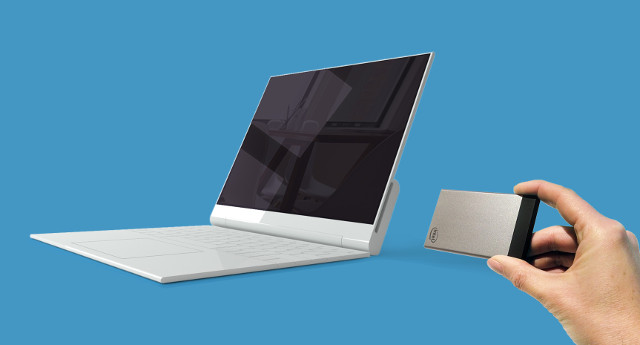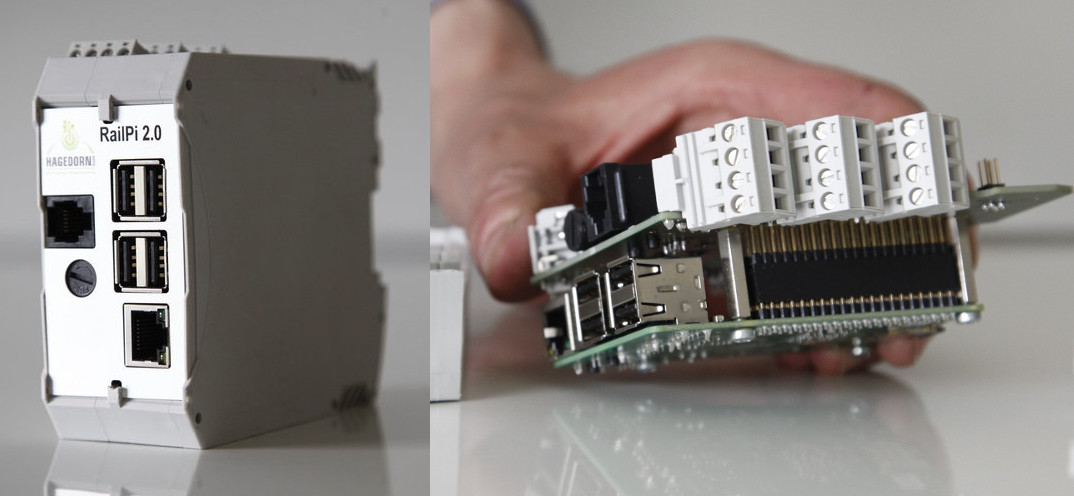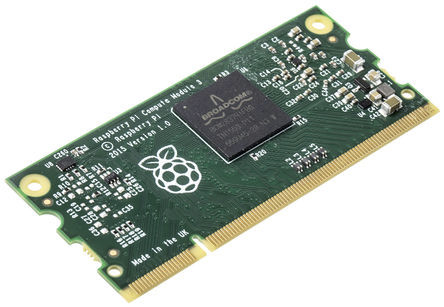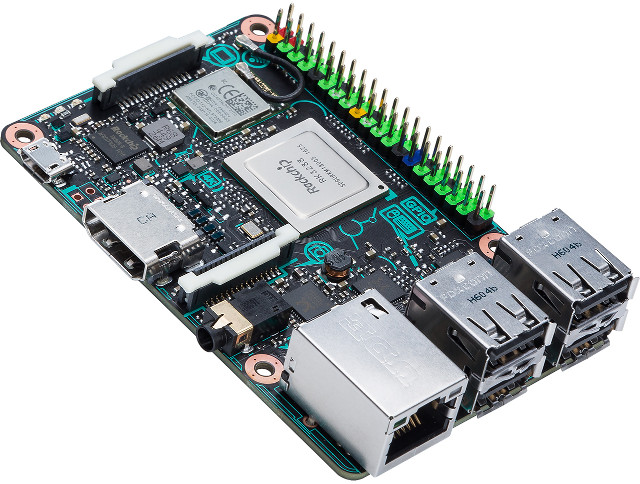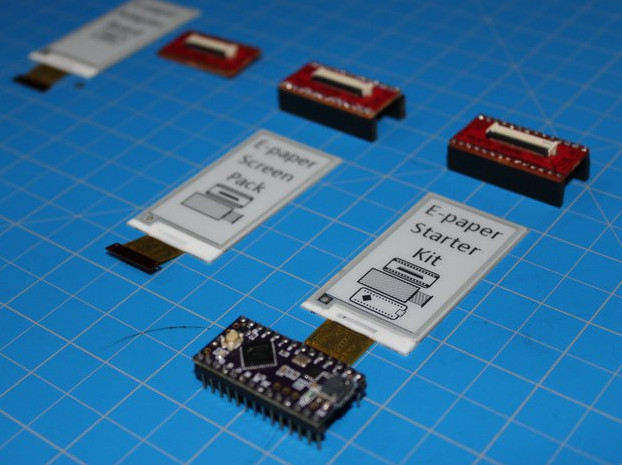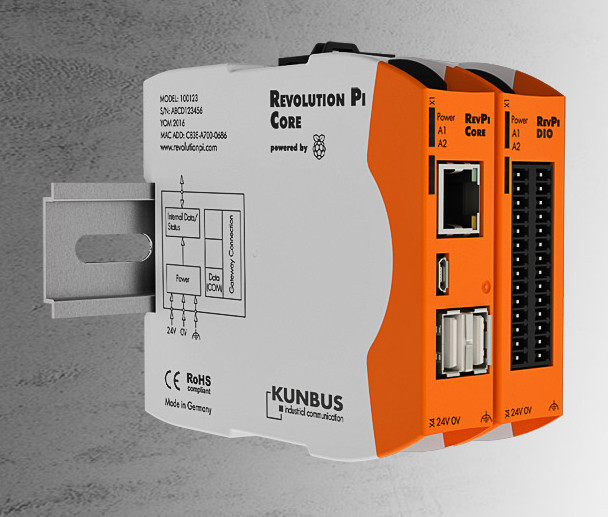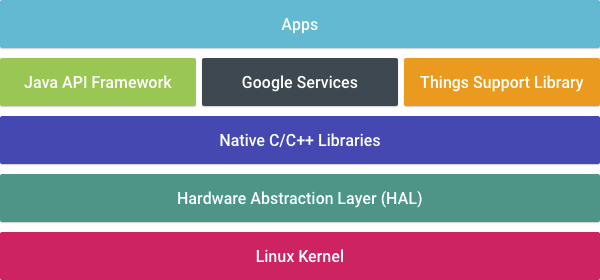NexDock first launched a 14″ laptop dock for smartphones, tablets, and development boards via a Indiegogo campaign in 2016, where they successfully raised over $350,000, and delivered rewards to backers last September and October. With the recent introduction of the Intel Compute Card, the company has now decided to work on a new NexDock that will take Intel’s cards. We don’t have much details right now, but the company said that beside the Intel Compute Card, it will come support interchangeable USB type-C modules, and will still support Windows 10 smartphones with continuum feature, Raspberry Pi and other devices that can be connected through a USB-C port. The second drawing also suggests the keyboard will be detachable, and you’ll be able to use NexDock as a Windows tablet. It could be nice to have an Intel laptop with Linux or Windows, and an ARM tablet with Android, but this won’t […]
RailPi 2.0 DIN Rail Enclosure & Industrial Expansion Board is Designed for Raspberry Pi 3 & ODROID-C2 Boards
We’ve already seen the Raspberry Pi compute module used for industrial applications with RevolutionPi RevPi Core industrial computer with a DIN rail enclosure, support for digital I/O modules and fieldbus gateways. Hagedorn Software Engineering GmbH, another German company has designed a similar industrial computer, called RailPi 2.0, with a DIN rail enclosure integrating an add-on board designed for Raspberry Pi 3 and ODROID-C2 boards. RailPi 2.0 specifications (adapted from Google Translation of website): I/Os 4x digital outputs, short-circuit-proof, PWM-compatible, with diode for the connection of inductive loads such as relays. 2x optically decoupled inputs, current-limited, with dimensions compliant with the S0 standard to allow them to be used with pules counters / current meters. RS485 interface 1-Wire bus placed at the front of the RailPi Bus connector for extensions with GND,I2C Clock (5V), I2C data (5V), 5V, and 12V Misc – Real-time clock Power Supply – Input voltage range of […]
Raspberry Pi 3 Compute Modules CM3 and CM3L Launched for $30 and $25
We all knew Raspberry Pi Compute Module 3 were about to be launched soon, as the Raspberry Pi foundation announced a partnership with NEC displays last October, and the datasheet for two version of the Broadcom BCM2837 based system-on-module, CM3 and CM3L (Light), was released shortly after. The good news is that the modules have officially been launched for $30 and $25 for respectively Compute Module 3 with 4GB flash, and Compute Module 3 Light with the SD card signals exposed via the SO-DIMM connector. The foundation has also lowered the original compute module price to $25. Here are Compute Module 3 specifications as a reminder: SoC – Broadcom BCM2837 quad core Cortex A53 processor @ 1.2 GHz with Videocore IV GPU System Memory – 1GB LPDDR2 Storage CM3L – SD card signals through SO-DIMM connector CM3 – 4GB eMMC flash 200-pin edge connector with: 48x GPIO 2x I2C, 2x SPI, […]
ASUS Tinker Board is a Raspberry Pi 3 Alternative based on Rockchip RK3288 Processor
Regular readers may remember MQMaker MiQi board, a $35 (and up) development board powered by Rockchip RK3288 quad core ARM Cortex A17 processor, based on Raspberry Pi 3 form factor, but much faster according to benchmarks. Sadly, the board’s crowdfunding campaign was not that successful, possibly because of the “its’ a 2-year old processor” syndrome. But now, Minimachines has found that ASUS has designed a very similar board, dubbed Tinker Board, with an extra WiFi and Bluetooth LE module, audio jack, MIPI DSI connector, and a few other modifications. Asus Tinker Board specifications (bold highlights and strike-through show differences with MiQi board): SoC – Rockchip 3288 quad core ARM Cortex A17 up to 1.8 GHz with Mali-T764 GPU supporting OpenGL ES 1.1/2.0 /3.0, and OpenCL 1.1 System Memory – 2GB LPDDR3, dual channel Storage – 8 or 32 GB eMMC flash + micro SD slot Video output & Display I/F 1x HDMI 2.0 up to 3840×2160@60p […]
Ten Most Popular Posts of 2016 on CNX Software and Some Stats
The last day of the year is a good time to look back at what the year brought us, and I have to say it has been a fun and interesting year on CNX Software. The TV boxes news cycle has been dominated by Amlogic products, but most products have now switched to 64-bit ARM SoC, with 4K and HDMI 2.0 support, and price have kept going down, so you can now get a 4K TV box for as low as $20, although many people will prefer spending a bit more for extra memory and support. Intel based Bay Trail & Cherry Trail mini PCs have continued to be released with Windows, and in some cases Ubuntu, but the excitement seems to have died off a bit, maybe with the expectation of upcoming Apollo Lake mini PCs that should be more powerful. The year have been especially fruitful in the […]
SonikTech e-Paper Shield Starter Kit Relies on Teensy LC MCU Board
Soniktek Electronics has designed the “e-Paper Shield Starter Kit” featuring Pervasive Displays’ E2215CS062 e-paper screen, and an adapter board to connect it to Teensy LC (Low Cost) board powered by NXP Kinetis L ARM Cortex M0+ microcontroller @ 48 MHz, or other 3.3V MCU boards supporting SPI. Adapter board & display specifications: Supports Pervasive Displays 2.15″ E2215CS062 e-paper screen with 208 x 112 resolution, no backlight required, fully sunlight-readable Communication protocol – SPI @ 3.3V Sensor – On-board thermometer with I2C interface Dimensions – Screen: 48 mm x 26 mm; adapter board fits into Teensy-LC module (36x18mm) The advantages of e-Paper display are that they don’t require power to maintain an image, and they can be read in sunlight, just like actual paper. I can’t remember having seen many – if any – low cost e-Paper development kits so far, and the project is open source hardware with design files and […]
Kunbus RevolutionPi RevPi Core Raspberry Pi based Industrial Computer Sells with Digital I/O Modules and Fieldbus Gateways
Kunbus, a German company specialized in industrial network solution, has decided to design an industrial system based on Raspberry Pi Computer module supporting variable power supply, a wide temperature range, DIN rail mounting, etc, as well as corresponding digital I/O modules and fieldbus gateways. RevolutionPI RevPi Core specifications: SoC – Broadcom BCM2835 ARM11 processor @ 700 MHz System Memory – 512 MB Storage – 4GB flash Video Output – Micro HDMI port Connectivity – 10/100M Ethernet port USB – 2x USB 2.0 host ports, 1x micro USB port Misc – RTC, 3x status LEDs (2 programmable) Power Supply – 10.7 V to 28.8 V; polarity protection; 4 kV / 8 kV ESD protection & EMI passed (according to EN61131-2 and IEC 61000-6-2), surge and burst tests passed Power Consumption – Max: 10 Watts including 2 x 450 mA USB load; typ.: 4 watts. Dimensions – 96 x 22.5 x 110.5 […]
Android Things OS for the Internet of Things Supports Raspberry Pi 3, Intel Edison, and NXP Pico Boards
Google introduced Project Brillo a little over a year ago, an operating system based on Android, but with a smaller footprint optimized for Internet of Things applications. Brillo has now just become Android Things OS, with Google releasing a developer preview of Android Things working on Raspberry Pi 3, Intel Edison, and NXP Pico boards. The company has also updated the Weave platform to simplify connection of all types of devices to the cloud, and interaction with services like the Google Assistant. The Weave Device SDK currently supports schemas for light bulbs, smart plugs, switches, and thermostats, with more type of device supported in the future, as well as a mobile app API for both Android and iOS. Using an Android based OS instead of a pure Linux OS should make it easier for Android app developers to create smart devices thanks to the use of familiar Android APIs and […]


